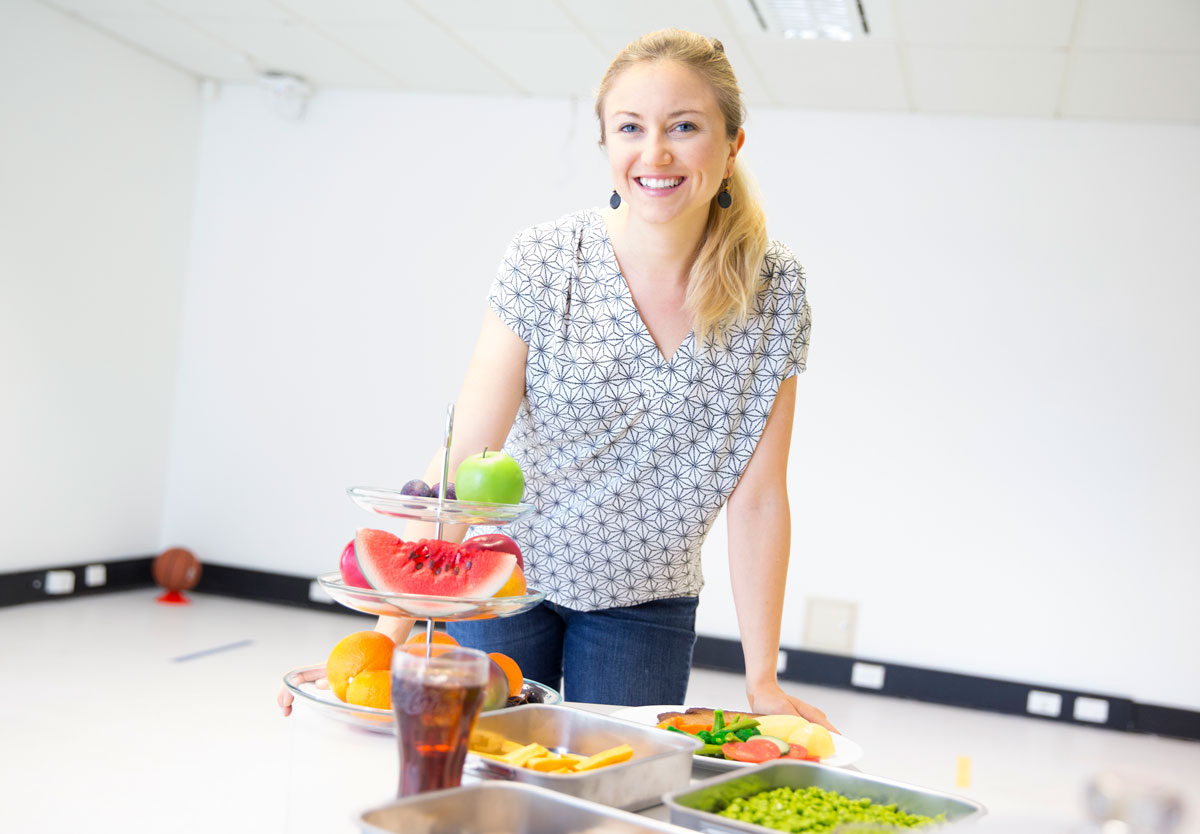Researcher Highlights
Nudging consumers toward better food choices
Dr Tamara Bucher
Collaborating with industry, consumers and a range of colleagues in different disciplines, Dr Tamara Bucher is leading research to ensure that we all have access to better, healthier food options.

The reasons behind why we eat what we eat are complex. We know that unhealthy environments are a major cause of the global obesity epidemic – particularly when junk food is available 24/7 and is so convenient and cheap. But what if we were to make healthy food just as readily available, enticing, delicious and affordable?
That’s the challenge that Tamara’s interdisciplinary research is aiming to address.
“There is no point in just telling people they need to eat better food, we all know that,” says Tamara. “Instead, what we’re looking at is how to nudge people toward better food choices and choosing healthy easier.”
Australian food outlets are now offering a much wider range of more healthful, simpler food options. Pre-chopped and packaged vegies or cooking boxes make a healthy meal quicker to put on the table. However, this kind of convenience comes at a cost – and much of it is not accessible to those on lower incomes or with large, hungry families.
“It would be nice if everybody could eat fresh food and cook from scratch, but not everyone has the time, skills or money to do that,” Tamara adds. “We want to make healthy food available for everyone, on every budget and every lifestyle.”
“I like to eat convenience food as well,” Tamara says with a laugh. “Sometimes I want fast food or a microwave meal, and I want those to be healthy and tasty as well as convenient. Convenience foods have a bad reputation, but if they have a good nutritional profile they can actually help people eat easier and better.”
Digital environments and food choices
‘Nowadays we make a lot of food choices online’. Tamara notes with interest how the COVID-19 pandemic changed the way we shop. The pandemic lockdowns caused an increase in meal delivery and online grocery shopping. “We saw businesses act in an agile and nimble manner where they rapidly moved online and looked for new ways to serve their customers,” Tamara says. “It’s worked so well, that we’ll see successful businesses continue to develop on this model into the future.”
“Australia was already set up for online delivery, and with COVID-19 that’s absolutely skyrocketed,” Tamara notes. “To build on that, what we need to look at is how to set up online environments so that people can make the best food choices.”
For Tamara, this means nudging.
“Nudging means making healthier food choices easier, without forbidding any foods,” she says. “We want to make them more appealing and accessible by creating environments that offer better choices through technology and different interfaces.”
Solving industry’s problems through doctoral training
Addressing these issues is not a simple task and requires leadership and collaboration with industry. The University’s Doctoral Training Centre in Food and Agribusiness is the platform where these complex problems are addressed. Tamara is the Academic Convenor of the centre, where she plays an integral role in overseeing HDR-based food/industry collaborations by connecting industry with PhD and higher degree students to real-world problems.
Wine research
We often pair food with wine, so it makes sense that Tamara is also Deputy Director of the Newcastle Wine Studies Network . “What influences our choices when we buy a bottle of wine? The label, the price, the placement on the shelves, where it’s from?” Tamara muses. “Interestingly, we know it doesn’t usually have much to do with how the wine tastes! It’s often all about marketing and how the bottle shop is organised.”
Tamara is particularly interested in alcohol free wine and has written about the topic for The Conversation. Drinking wine involves a great deal more than the alcohol content, and with mindful consumers looking to satisfy their tastebuds with low or zero-alcohol wines, beers and spirits – it’s a rapid-growth industry. “Adding alcohol free wine and beer to the drink menu, contributes to addressing alcohol related harm”, Tamara mentions.
Creating a sustainable food future
As a mid-career researcher in Nutrition and Consumer Behaviour with a background in Human Nutrition and Biology, Tamara has built global connections through strategic collaborations with international, interdisciplinary teams in Computer Science, Nutrition and Psychology. She is supervising several Dual Award Doctoral Degree students with partner Universities. “The most interesting things happen at the interface of different disciplines. When you bring together people from different areas, that’s where innovation is happening,” Tamara says.
Tamara has a firm focus on where her research will take her, and us. “I want to make a contribution to better eating environments,” Tamara says. “And make choosing healthier easier.”
“We don’t want to tell people what to do, but we want to create environments that offer a variety of sustainable, affordable, and convenient healthy foods, because in the end, we can only eat what we have available.”
The University of Newcastle acknowledges the traditional custodians of the lands within our footprint areas: Awabakal, Darkinjung, Biripai, Worimi, Wonnarua, and Eora Nations. We also pay respect to the wisdom of our Elders past and present.
